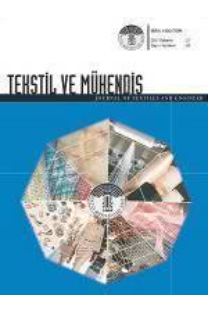ENVIRONMENTALLY FRIENDLY ACOUSTIC PANEL DESIGN FROM CURTAIN WASTE
ENVIRONMENTALLY FRIENDLY ACOUSTIC PANEL DESIGN FROM CURTAIN WASTE
Recycling, Acoustic Panel, Curtain Waste, Composite,
___
- 1. Islam, S., Bhat, G., (2019), Environmentally-friendly thermal and acoustic insulation materials from recycled textiles, Journal of Environmental Management, 251, 109536.
- All references were included within the file of manuscript.
- ISSN: 1300-7599
- Yayın Aralığı: Yılda 4 Sayı
- Başlangıç: 1987
- Yayıncı: TMMOB Tekstil Mühendisleri Odası
DIGITALISED NONWOVEN MANUFACTURING FOR REDUCED ENERGY CONSUMPTION AND EFFICIENT PRODUCTION RATES
M Murat PEKSEN, Fatma Banu NERGİS, Cevza CANDAN, Bilge KOYUNCU
SIFIR ATIK VE MODÜLER MODA TASARIMI: BİR KOLEKSİYON ÖNERİSİ
GİYİLEBİLİR TEKNOLOJİK SPOR ÜRÜNLERİ KULLANIMI ÜZERİNE BİR ARAŞTIRMA
Erhan BUYRUKOĞLU, Melek BAYINDIR
COLOR REMOVAL OF DISPERSE DYEING WASTE WATER BY OZONE IN AN EXAMPLE DYEHAUSE
Semiha EREN, Hüseyin Aksel EREN, Gizem BAYAÇLI, İrem ÖZYURT
DOĞAL RADYASYONUN YÖNETİMİYLE TASARLANAN KİŞİSEL TERMAL YÖNETİM SAĞLAYAN PASİF AKILLI YAPILAR
Sibel KAPLAN, Nazife KORKMAZ MEMİŞ
PHB, PHBV ve KARIŞIMI ELEKTRO ÇEKİM LİFLERİN ÜRETİMİ ve KARAKTERİZASYONU
Hatice Aybige AKDAĞ, Sebnem DUZYER GEBİZLİ, Aslı HOCKENBERGER
GÖMLEK GİYİMİ İLE İLGİLİ TÜKETİCİ KONFOR DENEYİMLERİNİN VE TÜKETİCİ BEKLENTİLERİNİN İNCELENMESİ
Selma DOLANBAY DOĞAN, Nurgul KILINÇ
INVESTIGATION OF THE DYEABILITY OF COTTON FABRICS WITH BACTERIAL COLORANTS
ENVIRONMENTALLY FRIENDLY ACOUSTIC PANEL DESIGN FROM CURTAIN WASTE
Gamze AÇIKGÖZ, Onur AYDIN, Alp Yaman ALTUĞ, Hande SEZGİN, İpek YALÇIN ENİŞ
